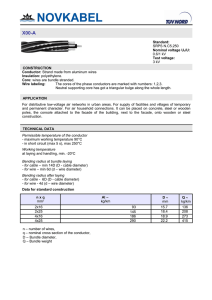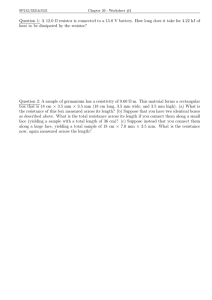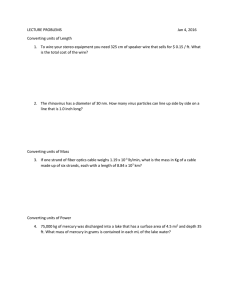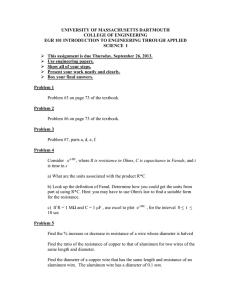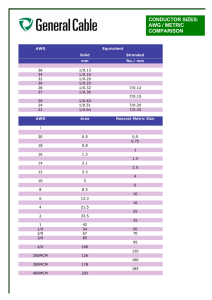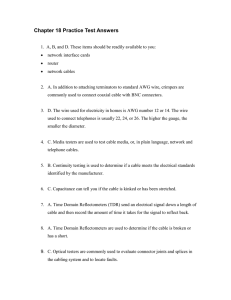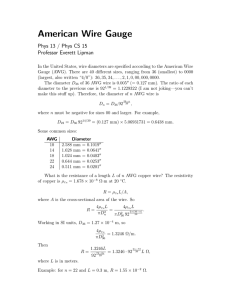Conversion and calculation-20100909
advertisement
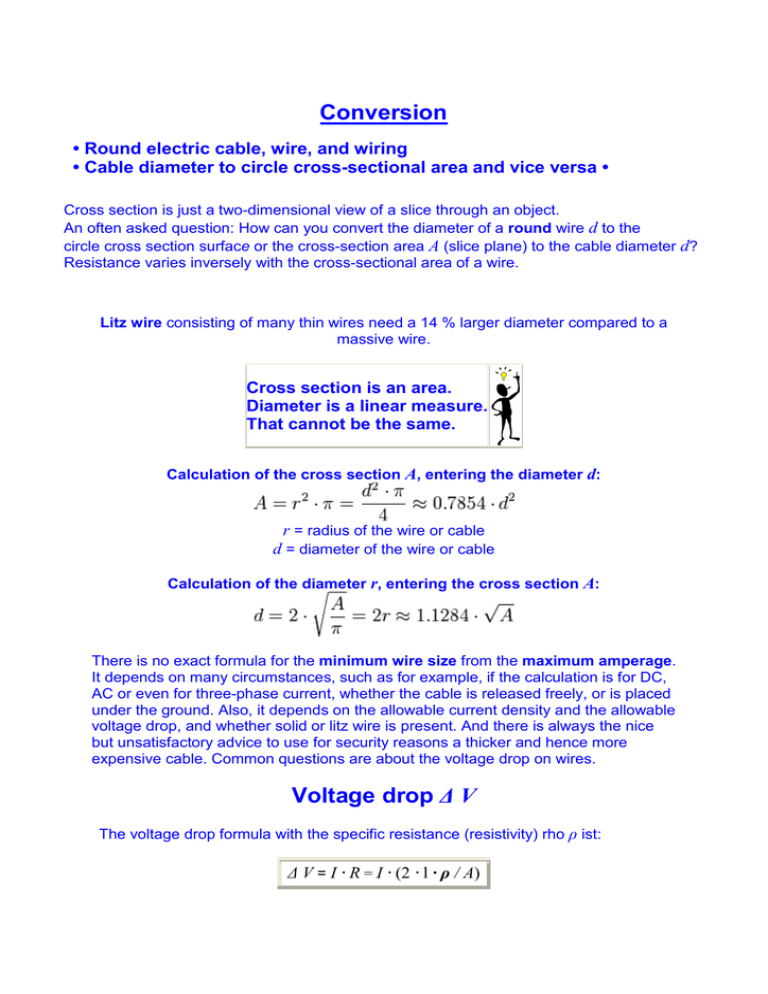
Conversion • Round electric cable, wire, and wiring • Cable diameter to circle cross-sectional area and vice versa • Cross section is just a two-dimensional view of a slice through an object. An often asked question: How can you convert the diameter of a round wire d to the circle cross section surface or the cross-section area A (slice plane) to the cable diameter d? Resistance varies inversely with the cross-sectional area of a wire. Litz wire consisting of many thin wires need a 14 % larger diameter compared to a massive wire. Cross section is an area. Diameter is a linear measure. That cannot be the same. Calculation of the cross section A, entering the diameter d: r = radius of the wire or cable d = diameter of the wire or cable Calculation of the diameter r, entering the cross section A: There is no exact formula for the minimum wire size from the maximum amperage. It depends on many circumstances, such as for example, if the calculation is for DC, AC or even for three-phase current, whether the cable is released freely, or is placed under the ground. Also, it depends on the allowable current density and the allowable voltage drop, and whether solid or litz wire is present. And there is always the nice but unsatisfactory advice to use for security reasons a thicker and hence more expensive cable. Common questions are about the voltage drop on wires. Voltage drop ∆ V The voltage drop formula with the specific resistance (resistivity) rho ρ ist: ∆ V = I · R = I · (2 · l · ρ / A) I = Current in ampere l = Wire (cable) length in meters (times 2, because there is always a return wire) ρ = rho, electrical resistivity (also known as specific electrical resistance or volume resistivity) of copper = 0.01724 ohm·mm²/m (Ohms for l = 1 m length and A = 1 mm2 cross section area of the wire) ρ = 1 / σ A = Cross section area in mm2 σ = sigma, electrical conductivity (electrical conductance) of copper = 58 S·m/mm2 Quantity of resistance R = resistance ρ = specific resistance l = length of the cable A = cross section Ω Ω·m m m2 Electrical conductivity Electrical resistivity Electrical conductance Specific resistance copper σ = 58 ρ = 0.0172 aluminium σ = 36 ρ = 0.0277 silber σ = 62 ρ = 0.0161 metal Electrical conductivity σ: 58 S · m / mm² σ=1/ρ ↔ Specific elec. resistance ρ: 0.017241 Ohm · mm² / m ρ=1/σ The value of the electrical conductivity (conductance) and the specific electrical resistance (resistivity) is a temperature dependent material constant. Mostly it is given at 20 or 25°C. Resistance = resistivity x length / area The specific resistivity of conductors changes with temperature. In a limited temperature range it is approximately linear: where α is the temperature coefficient, T is the temperature and T0 is any temperature, such as T0 = 293.15 K = 20°C at which the electrical resistiv ity ρ (T0) is known. Calculator: Ohm's law Table of typical loudspeaker cables 0.798 mm Cable nominal cross 0.5 section A mm2 Maximum electrical 3A current Cable diameter d 0.977 mm 0.75 mm2 1.128 mm 1.0 mm2 1.382 mm 1.5 mm2 1.784 mm 2.5 mm2 2.257 mm 4.0 mm2 7.6 A 10.4 A 13.5 A 18.3 A 25 A 2.764 mm 6.0 mm2 3.568 mm 10.0 mm2 32 A - Always consider, the cross section must be made larger with higher power and higher length of the cable, but also with lesser impedance. Here is a table to tell the possible power loss. Cable Power loss at Damping factor at Section Resistance length in mm2 in ohm Impedance Impedance Impedance Impedance in m 8 ohm 4 ohm 8 ohm 4 ohm 1 2 5 10 20 0.75 1.50 2.50 4.00 0.75 1.50 2.50 4.00 0.75 1.50 2.50 4.00 0.75 1.50 2.50 4.00 0.75 1.50 2.50 4.00 0.042 0.021 0.013 0.008 0.084 0.042 0.026 0.016 0.210 0.125 0.065 0.040 0.420 0.250 0.130 0.080 0.840 0.500 0.260 0.160 0.53% 0.31% 0.16% 0.10% 1.06% 0.62% 0.32% 0.20% 2.63% 1.56% 0.81% 0.50% 5.25% 3.13% 1.63% 1.00% 10.50% 6.25% 3.25% 2.00% 1.05% 0.63% 0.33% 0.20% 2.10% 1.26% 0.66% 0.40% 5.25% 3.13% 1.63% 1.00% 10.50% 6.25% 3.25% 2.00% 21.00% 12.50% 6.50% 4.00% 98 123 151 167 65 85 113 133 32 48 76 100 17 28 47 67 9 15 27 40 49 62 75 83 33 43 56 66 16 24 38 50 9 14 24 33 5 7 13 20 The damping factor values show, what remains of an accepted damping factor of 200 depending on the cable length, the cross section, and the impedance of the loudspeaker. Conversion of cable diameter to AWG and AWG to cable diameter in mm The gauges we most commonly use are even numbers, such as 18, 16, 14, etc. If you get an answer that is odd, such as 17, 19, etc., use the next lower even number. AWG stands for American Wire Gauge and refers to the strength of wires. These AWG numbers show the diameter and accordingly the cross section as a code. They are only used in the USA. Sometimes you find AWG numbers also in catalogues and technical data in Europe. AWG 46 45 44 43 42 41 40 39 38 37 36 35 34 number Diameter 0.0016 0.0018 0.0020 0.0022 0.0024 0.0027 0.0031 0.0035 0.0040 0.0045 0.0050 0.0056 0.0063 in inch Diameter (Ø) 0.04 0.05 0.05 0.06 0.06 0.07 0.08 0.09 0.10 0.11 0.13 0.14 0.16 in mm Cross section 0.0013 0.0016 0.0020 0.0025 0.0029 0.0037 0.0049 0.0062 0.0081 0.010 0.013 0.016 0.020 2 in mm AWG 33 32 31 30 29 28 27 26 25 24 23 22 21 number Diameter 0.0071 0.0079 0.0089 0.0100 0.0113 0.0126 0.0142 0.0159 0.0179 0.0201 0.0226 0.0253 0.0285 in inch Diameter (Ø) 0.18 0.20 0.23 0.25 0.29 0.32 0.36 0.40 0.45 0.51 0.57 0.64 0.72 in mm Cross section 0.026 0.032 0.040 0.051 0.065 0.080 0.10 0.13 0.16 0.20 0.26 0.32 0.41 2 in mm AWG 20 19 18 17 16 15 14 13 12 11 10 9 8 number Diameter 0.0319 0.0359 0.0403 0.0453 0.0508 0.0571 0.0641 0.0719 0.0808 0.0907 0.1019 0.1144 0.1285 in inch Diameter (Ø) 0.81 0.91 1.02 1.15 1.29 1.45 1.63 1.83 2.05 2.30 2.59 2.91 3.26 in mm Cross section 0.52 0.65 0.82 1.0 1.3 1.7 2.1 2.6 3.3 4.2 5.3 6.6 8.4 2 in mm AWG number 7 6 5 4 3 2 1 0 (1/0) (0) 00 (2/0) (-1) 000 (3/0) (-2) 0000 00000 000000 (4/0) (5/0) (6/0) (-3) (-4) (-5) Diameter 0.1443 0.1620 0.1819 0.2043 0.2294 0.2576 0.2893 0.3249 0.3648 0.4096 0.4600 0.5165 0.5800 in inch Diameter (Ø) 3.67 4.11 4.62 5.19 5.83 6.54 7.35 8.25 9.27 10.40 11.68 13.13 14.73 in mm Cross section 10.6 13.3 16.8 21.1 26.7 33.6 42.4 53.5 67.4 85.0 107.2 135.2 170.5 2 in mm
